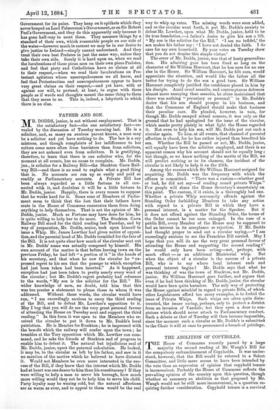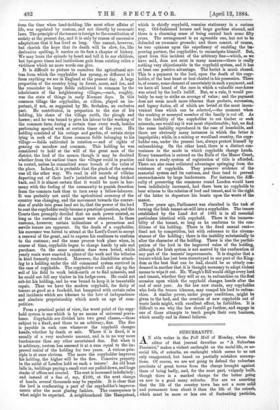THE ABOLITION OF COPYHOLDS. T HE House of Commons recently passed
by a large majority the second reading of Mr. Waugh's Bill for the compulsory enfranchisement of Copyholds. It was under- stood, however, that the Bill would be referred to a Select Committee, and little more seems to have been intended by the vote than an expression of opinion that copyhold tenure is inconvenient. Probably the House of Commons reflects the prevailing opinion of the country upon this question, though whether so summary an abolition as that proposed by Mr. Waugh would not be still more inconvenient, is a question re- quiring further consideration. Copyhold tenure is a survival
from the time when land-holding, like most other affairs of life, was regulated by custom, and not directly by economic laws. The principle of the tenure is foreign to the constitution of society at the present day, and it is only by reason of successive adaptations that it has lived so long. One cannot, however, but cherish the hope that its death will be slow, for, like derivative spelling, it carries on its face a chapter of history. We may learn the episode by heart and tell it to our children, but bye-gone times and institutions gain from existing relics a vividness which no mere words can give.
It is difficult to picture to ourselves the agricultural sys- tem, from which the copyholder has sprung, so different is it from anything we see in England at the present day. A large proportion of the country lying in forest, moor, and fen, and the remainder in large fields cultivated in common by the inhabitants of the neighbouring villages,—such, roughly, was the state of things in early Norman days. In this common tillage the copyholder, or villein, played an im- portant, if not, as suggested by Mr. Seebohm, an exclusive part. He contributed, in proportion to the size of his holding, his share of the village outfit, the plough and horses ; and he was bound to give his labour to the working of the common farm during a certain time every week, besides performing special work at certain times of the year. His holding consisted of his cottage and garden, of certain strips lying in each of the three common fields belonging to his village — fields cultivated in rotation— and of rights of grazing on meadow and common. This holding he was considered to hold at the will of the great man of the district, the lord of the manor, though it may be doubted whether from the earliest times the villager could in practice be ousted, unless he committed some breach of the rules of the place. Indeed, it is probable that the pinch of the system was all the other way. We read in old records of villeins departing out of their lord's jurisdiction and being fetched back, and it is almost certain that it would be more in har- mony with the feeling of the community to punish desertion from the common task than to turn away a fellow-labourer. It was probably not until the agricultural economy of the country was changing, and the movement towards the conver- sion of arable into grass land set in, that the power of the lord to oust the copyholder really became a practical question, and the Courts then promptly decided that no such power existed, so long as the customs of the manor were observed. In these customs, however, certain indications of a precarious and servile tenure are apparent. On the death of a copyholder, his successor was forced to attend at the Lord's Court to accept a renewal of the grant, and to express his readiness to conform to the customs ; and the same process took place when, in course of time, copyholds began to change hands by sale and purchase. On the same occasion dues were levied, while yearly rents were exacted in place of the work and the tributes in kind formerly rendered. Moreover, the disabilities attach- ing to a holding under the old communal system survived in the case of copyholds. The copyholder could not dig up the soil of his field to work brick-earth or to find minerals, and he could not fell any timber in his hedge-rows. He could not sub-let his holding, and he was bound to keep it in tenantable repair. Thus we have the modern copyhold, for fixity of tenure as good as a freehold, but hampered with certain rules and incidents which are irksome to the love of independence and absolute proprietorship which mark an age of com- petition.
From a practical point of view, the worst point of the copy- hold system is one which is by no means of universal preva- lence. Copyholds are divided into two great classes,—those subject to a fixed, and those to an arbitrary, fine. The fine is payable in each case whenever the copyhold changes hands, whether by death or sale. Where it is fixed, it is usually of a very moderate amount, and is in no way more burdensome than any other ascertained due. But when it is arbitrary, custom has assessed it at a sum equal to the im- proved rental of the holding for two years. A vicious prin- ciple is at once obvious. The more the copyholder improves his holding, the higher will be the fine. Conceive property in the midst of London held on such a tenure ! An old lease falls in, buildings paying a small rent are pulled down, and huge stacks of offices are erected. The rent is increased indefinitely; and instead of a fine of, say, £100, at the next change of hands, several thousands may be payable. It is, clear that the lord is confiscating a part of the copyholder's improve- ments after the most glaring fashion. The consequence is what might be expected. A neighbourhood like Hampstead,
which is chiefly copyhold, remains stationary in a curious way. Old-fashioned houses and large gardens abound, and there is a charming sense of being carried back some fifty years. The arrangement is an agreeable one, but not to be defended on economic grounds; and there cannot, of course, be two opinions upon the expediency of enabling the im- proving partner, the copyholder, to emancipate himself. But, apart from this incident of the arbitrary fine—which, as we have said, does not exist in many manors—there is really nothing very objectionable in the copyhold system, and it has at least one positive advantage. The heriot is much abused. This is a payment to the lord, upon the death of the copy- holder, of the best beast or best chattel in his possession. There is, of course' some element of uncertainty in such a payment, and we have all heard of the case in which a valuable race-horse was seized by the lord's bailiff. But, as a rule it would pro- bably be easy to strike an average of value ; and the payment does not seem much more irksome than probate, succession, and legacy duties, all of which are levied at the most incon- venient time which can be selected,—the moment when the working or moneyed member of the family is cut off. As to the inability of the copyholder to cut timber or seek minerals, one would say it was most objectionable ; but, we find the same inability reproduced in the case of leaseholds, and there are obviously many instances in which the fetter is impalpable ; while, in a mining or woodland country, the copy- holder can, under the present law, always protect himself by enfranchising. On the other hand, there is a distinct con- venience in the mode in which copyholds change hands. Every transaction is entered on the Rolls of the Manor Court, and thus a ready system of registration of title is afforded. There are also some collateral advantages springing from the existence of copyholds. They preserve evidence of the manorial system and its customs, and thus tend to prevent encroachments by large landowners. For instance, the diffi- culty of preserving the commons round London would have been indefinitely increased, had there been no copyholds to bear witness to the relation of lord and tenant, and to the right of the latter to depasture his beasts upon the waste of the manor.
Three years ago, Parliament was absorbed in the task of turning the Irish tenant-at-will into a copyholder. The tenure established by the Land Act of 1881 is in all essential particulars identical with copyhold. There is the immova- bility of the tenant, so long as he conforms to the con- ditions of his holding. There is the fixed annual rent— fixed not by competition, but with reference to the circum- stances of the holding ; there is the inability substantially to alter the character of the holding. There is also the partici- pation of the lord in the improved value of the holding, although the Irish system is not marred by the confiscation of any part of the tenants' improvements. It is singular that a tenure which has just been stereotyped in one part of the King- dom as the best that can be had, should be so utterly con- demned in another that it is thought necessary to adopt violent means to wipe it oat. Mr. Waugh's Bill would oblige every lord and tenant, whether they will or no, to enfranchise on the first occasion upon which the copyhold changes hands after the end of next year. As the law now stands, any copyholder who feels the tenure irksome, may compel his lord to enfran- chise. A similar power, under proper conditions, might be given to the lord, and the creation of new copyholds out of waste lands might, with excellent effect, be forbidden. It is difficult to see why the law should go further, and engage in one of those attempts to teach people their own business, which usually end in dismal failures.



































 Previous page
Previous page